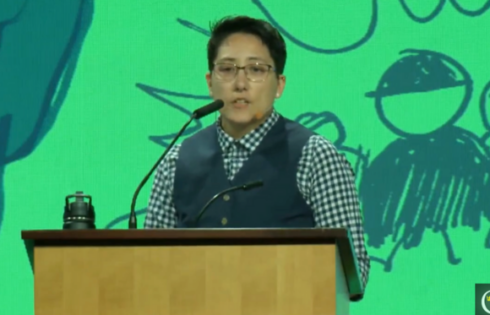
A female University of Oregon student is facing a litany of code of conduct violation charges for a joke razzing another student.
In fact, she faces more charges – five – than words in the actual joke itself, which was: “I hit it first.”
What happened, according to detailed letters released Tuesday by the Foundation for Individual Rights in Education, was a University of Oregon female student visited some friends at a dorm in June, saw a couple walking outside, and decided to razz them by yelling out the window: “I hit it first!” The gal she yelled down at called back: “F*ck you, b*tch.”
The Assistant Residence Life Coordinator, informed of the situation, hunted the jokester down, and she apologized to the couple. End of story, right? Wrong.
A “Notice of Allegation” to the student, who has asked to remain anonymous, accuses her of: community disruption; a housing violation; harassment; university disruption; and disorderly conduct. It requires her to set up a hearing to determine her innocence or guilt by mid-October.
“The University of Oregon’s absurd overreaction is the real joke here, and it’s not very funny,” said FIRE Senior Vice President Robert Shibley in a news release Tuesday. “Using an unconstitutional speech code to punish a student for a joke shows how out of control censorship has become on our campuses in the name of making everyone feel ‘comfortable.’ ”
FIRE has taken up the student’s cause, demanding the charges be dropped.
“The charges … violate her rights to free expression and unacceptably chill the speech of UO students generally in violation of both the United States and Oregon constitutions,” the organization stated in an Aug. 1 letter to campus President Michael Gottfredson, adding:
In Davis v. Monroe County Board of Education, 526 U.S. 629 (1999), the Supreme Court set
forth a strict definition of student-on-student (or peer) harassment. In order for student
conduct (including expression) to constitute actionable harassment, it must be (1)
unwelcome, (2) discriminatory on the basis of gender or another protected status, (3)
directed at an individual, and (4) “so severe, pervasive, and objectively offensive that it can
be said to deprive the victim of access to the educational opportunities or benefits
provided by the school.” … By definition, this includes only extreme and typically
repetitive behavior—conduct so serious that it would prevent a reasonable person from
receiving his or her education. Although the Davis formulation was crafted by the Court in
the context of sexual harassment, its requirement that harassment be so severe, pervasive,
and objectively offensive that it substantially interferes with the victim’s ability to receive
his or her education is instructive in the general harassment context as well. …[The student’s] single four-word comment to the complaining students comes nowhere close to approaching the level of severity and pervasiveness required by Davis. A single, momentary communication can hardly be said to be either severe or pervasive, and it is difficult to imagine how any reasonable person’s education would be substantially interfered with by such a fleeting, mildly offensive comment. …
The harassment policies under which [the student] was charged are unconstitutionally overbroad in numerous ways. A statute or law regulating speech is overbroad “if it sweeps within its ambit a substantial amount of protected speech along with that which it may legitimately regulate.” Doe v. University of Michigan, 721 F. Supp. 852, 864 (E.D. Mich. 1989), citing Broadrick v. Oklahoma, 413 U.S. 601, 612 (1973)
“It is remarkable that the university apparently didn’t give a first thought to this student’s First Amendment rights before throwing the book at her and allowing these unconstitutional charges to hang over her head for the entire summer,” said Peter Bonilla, director of FIRE’s Individual Rights Defense Program, in a news release Tuesday. “Incoming and returning UO students should be aware of the lack of regard shown by the university for their right to free speech.”
Like The College Fix on Facebook / Follow us on Twitter
IMAGE: Michael Li/Flickr







Please join the conversation about our stories on Facebook, Twitter, Instagram, Reddit, MeWe, Rumble, Gab, Minds and Gettr.